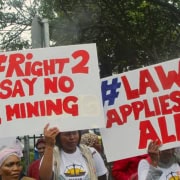|
Getting your Trinity Audio player ready...
|
South Africa’s mining industry has, for decades, bolstered the country’s economy. But the cost in human terms, particularly for communities who are affected by mining operations, is significant and often overlooked in the drive for profit and productivity.
A new paper, written by mining and labour law specialist Dr. Godknows Mudimu, explores the role of meaningful consultation in producing sustainable and acceptable outcomes for communities, particularly vulnerable community members who are often disproportionately affected by land deprivation. Mudimu has extensive experience in developing sustainable solutions for mining companies and mining-affected communities.
His paper argues that meaningful consultation, when conducted according to the provisions of the Mineral and Petroleum Resources Development Act and the Interim Protection of Informal Land Rights Act, translates into meaningful outcomes for those who hold informal title to land.
“The precarious nature of informal rights to the land in question affects the overall outcomes that communities receive from consultation processes,” the paper notes. “The nature and quality of such consultations depend directly on the strength of the rights of the lawful owners and occupiers of the land in question.”
Consultation between mining companies and land owners or lawful occupiers is crucial, not only because the law demands it but also because it clears up potential tensions between the parties, sets out a responsible way forward that works for all involved, and equips land owners or occupiers with the necessary information to make informed decisions. In this way, consultation strengthens the bargaining position of affected communities, making it possible for them to still experience the full realisation and enjoyment of their rights.
The paper accordingly explores the legal framework for consultations, examines the intersection of the relevant statutory law and customary law, and discusses judgments and case law that illuminate the rationale for consultation.
“In South Africa, courts have taken a leading role in interpreting the rights of communities in relation to consultations, resettlements, and compensation.”
The paper also examines a case study where meaningful consultation, although lengthy, resulted in improved outcomes for the community involved. Finally, recommendations are provided for the future benefit of other similarly placed communities.
Read the paper below, or download it.
This research paper has been produced with the financial assistance of the European Union. It forms part of the Rallying Efforts to Accelerate Progress (REAP) project implemented by Corruption Watch in partnership with Transparency International.








